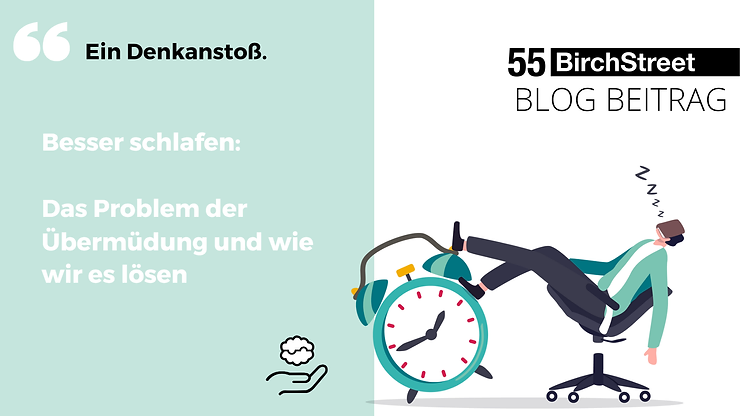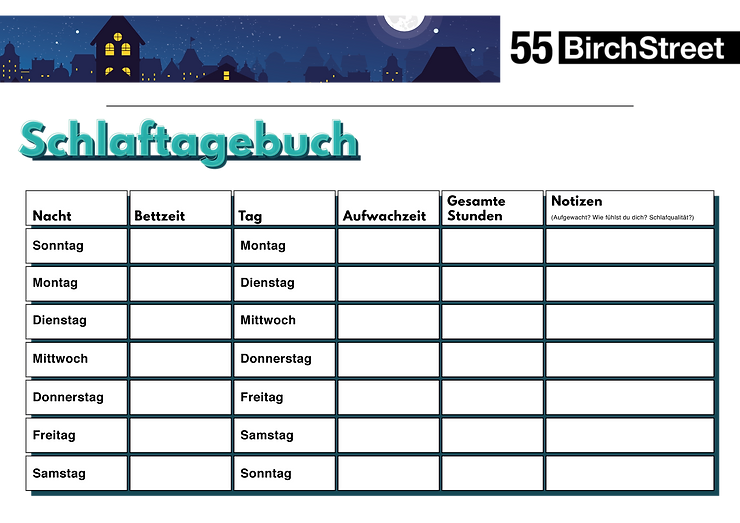
It is not unlikely that this post will be read with slightly dull eyes and an occasional yawn (which we don't take personally 😉). At least you're not alone with that. We live in a tired society — and that often worries you when you roll over in bed again, look at the clock sporadically and feel anxious about the next day with too little sleep. Ironically, it is these very concerns that keep us from sleeping even more. After all, it is repeatedly emphasized that sleep is just as essential for health as a balanced diet and sufficient exercise. If this then appears to be outside of your own control, that is of course worrying.
But breathe in and out, please. In fact, it is only half as wild. We show you how to escape the panic culture about sleeping and maybe get some sleep. 💤
Not only health, but also economics is a good reason for bed rest! There is still a misconception that people who sleep less do more (under the logic that this leaves more time for work). That that's not true at all Sleep expert Nina Kapp also confirms: “Exactly the opposite is the case. Nature would have abolished sleep long ago if it were useless. But it is a highly active, vital process that has a massive impact on our performance and therefore also on our professional and private success.”
Kapp explains that sleep determines success and failure — and anyone who sleeps poorly will feel this in their actions. After a good night's sleep, we are more thoughtful, more powerful and, above all, more concentrated, which is why the first companies — Google and Netflix, for example — introduced nap rooms; studies from Stanford also suggest that when you sleep well, you are 26% more productive. Sleep is therefore a significant economic factor that we do not pay enough attention to. Kapp therefore makes it clear: Sleep is also a corporate matter. Not only because of the interest in cognitive performance, but also because it is often work that causes sleepless nights. According to Kapp, this potential is still untouched in many places — at least 43 percent of Germans are not fully efficient due to lack of sleep.
Lack of sleep not only compromises our performance, but also our mood. Of course, it's stressful and annoying when you feel like you're sleepwalking for half a day and still spinning in bed at night because of some perfidious hint of fate, you still can't doze off. But why do so many looping thoughts occur at night? Sleep expert Dr. Prather explainsThat we often don't dedicate ourselves to our thoughts during the day and stir them up accordingly at night. However, it is not just overthinking that Robs us of bed rest: Too much coffee too late, sleep disorders, sleep times that are out of sync with Our internal clock is, including smartphones, of course (more on this later). Revenge Bedtime Procrastination Is also a classic: Extra time that you stay awake to compensate for lost time in the day, which you have spent working or taking care of others, for example.
You yourself will know best what exactly is robbing you of sleep. But probably the most bizarre — and frequently most common — reason is and remains: I Worry So Much About Sleeping That It Keeps Me Awake. Let's fix that then. Maybe it's not so important what keeps you awake, but what makes you fall asleep.
To make one thing clear: You can hardly be bad at sleep. Unless you're Thai Ngoc — the man who is said to have been awake since 1962. Thai Ngoc doesn't count.
Sleeping is a natural process for most of us. Apart from special medical cases, it is not really possible to be bad at this. Nonetheless, we're all asleep Variegated. There are average sleep times that we need, but there are also exceptions — some only need six hours, others more like ten and then it all varies as we get older.
It is important to understand that sleep is not quantitative but qualitative It must be a project. If you sleep for eight hours but wake up every 30 minutes, you won't feel rested. At the end of the day, the big thing they have in common is: Close your eyes and switch off. If you sleep too little, your body will tell you that. As an aid The following questions Useful:
Hands up for anyone who has already blamed themselves for simply not getting out of bed in the morning, combined with the latent sense of guilt that you don't tackle the day and all your projects. 👋 In Scottish, there is a very charming term for this: Hurkle-durkle: Relaxing waking time in bed in the morning to get back that little bit of peace that was previously denied to you. Nice What is important, however, is Like This time is used. Hurkle-durkling is no justification for the morning with Mindless scrolling and spending bad news, but a measure to determine your own rest time, As Eleanor McGlinchey explains. The sleep expert therefore recommends spending this time in a defined man. A dream journal, listening to music, doing crossword puzzles, reading something, or simply looking out the window with a cup of coffee and watching the noise of the big city pass you by for once.
There is no fixed time window. However, 15 to 30 minutes should be enough for most of us when used daily. Sleep doesn't replace this, but Hurkle-Durkling offers similar benefits. It's not a matter of laziness, but mindfulness.
With hopefully less sense of guilt and concern in the back of your mind, you can actually ask: What does it take to sleep better? Here are the most important tips, even though they don't have to be integrated all at the same time, of course. See what you like and could best help. 😉
First of all, a sleep diary is an effective way to get an overview of your own sleep patterns. Not only does it prove useful if you want to find out how little (or much) you actually sleep, this can also prove to be a valuable resource for doctors if you suspect that you are suffering from a sleep disorder. With this in mind, we have created an example table for you, which you can use for documentation.

The document works as follows:
For Hurkle Durklers, it should be said that a sleep diary can also be a nice activity in bed. 😉 Nevertheless, you should maintain a certain neutrality with your own sleep diary. Sleep expert Camilla Stoddart warns If this only creates additional stress, refrain from this method.
Our research has produced the following methods for improving your own sleep:
We often make sleeping really harder for ourselves than it should be. The most important final word must therefore be: Close your eyes, lie down and, of course, good night. 🛌💤
For further reading:
Do you have a question or would you like to find out how we can work together?
Feel free to contact us here or via linkedin with us — we'd love to hear from you